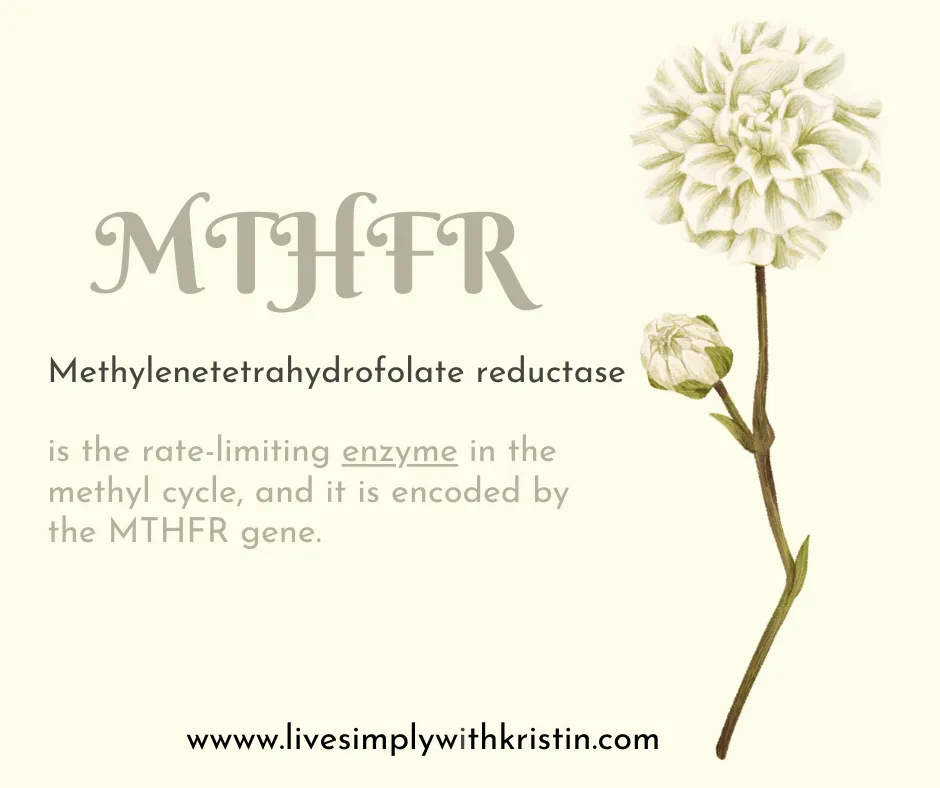
Understanding the MTHFR Gene: My Journey and Simple Tips for Managing Symptoms
Have you heard of the MTHFR gene? It’s a topic that might sound scientific or overwhelming, but understanding it can be life-changing. I found out I had the MTHFR gene mutation in January 2022 after struggling with unexplained health issues. This discovery led me down a path of learning how to support my body better, and I’m excited to share what I’ve learned.
What is the MTHFR Gene?
The MTHFR gene provides instructions for making an enzyme called methylenetetrahydrofolate reductase. This enzyme helps your body process folate (vitamin B9), which is critical for DNA production, detoxification, and many other essential processes.
When someone has an MTHFR gene mutation, their body might struggle to break down and use folate efficiently, leading to potential health challenges like:
- Fatigue
- Mood swings or anxiety
- Hormonal imbalances
- Digestive issues
- Difficulty detoxing
My Personal Discovery of the MTHFR Gene Mutation
In January 2022, after months of feeling off, I decided to dig deeper. My doctor suggested doing some blood work, and that’s when I discovered I had an MTHFR mutation. While the news initially felt overwhelming, it also brought relief—finally, an explanation! From there, I began exploring ways to support my body, which included adding supplements, changing certain habits, and paying closer attention to my health.
How My VTOS/NTOS Journey Tied into MTHFR
My journey with Venous Thoracic Outlet Syndrome (VTOS) and Neurogenic Thoracic Outlet Syndrome (NTOS) further underscored the importance of addressing underlying health issues. These conditions caused a range of physical challenges, and managing them required a holistic approach, including better nutrition, reducing inflammation, and supporting my body’s healing processes.
Read more about my Vtos Journey here.
Learning about my MTHFR mutation gave me additional insight into why I might have experienced more inflammation and slower recovery than expected. It also empowered me to make specific changes, like incorporating L-MethylFolate 5-MTHF, which improved my energy and overall resilience during this journey.
Why L-MethylFolate 5-MTHF is a Game-Changer
One of the best things you can do if you have an MTHFR mutation is to supplement with the right form of folate. Enter L-MethylFolate 5-MTHF—a bioavailable form of folate that your body can absorb and use right away.
Unlike synthetic folic acid, which people with MTHFR mutations often can’t process, 5-MTHF ensures you get the folate your body needs for:
- Improved energy levels
- Better mood and mental clarity
- Support with detoxification
- Hormonal balance
This supplement has been a lifesaver for me, and I highly recommend giving it a try. You can find the one I use here.
Tips for Managing MTHFR Symptoms
Beyond supplements, there are simple ways to support your body and manage symptoms:
- Focus on a Whole Foods Diet
Eat plenty of high-quality proteins, organic fruits, and vegetables. Avoid processed foods and limit sugar, as these can increase inflammation and stress on the body. - Avoid Synthetic Folic Acid
Many processed foods and vitamins contain synthetic folic acid. Instead, look for natural folate sources like leafy greens or supplements with L-MethylFolate. - Support Detoxification
People with MTHFR mutations may have trouble detoxing. Help your body by drinking plenty of water, eating detoxifying foods (like cruciferous vegetables), and incorporating Epsom salt baths or gentle exercise. - Manage Stress
Chronic stress can worsen symptoms. - Regular Checkups
Work with a doctor who understands MTHFR. They can recommend personalized strategies for your health.
Foods to Avoid to Support MTHFR Health
If you have an MTHFR mutation, being mindful of what you eat is essential. Certain foods can increase inflammation or interfere with your body’s ability to function optimally. Here are some foods to avoid:
- Processed and Packaged Foods: These often contain synthetic folic acid, which people with MTHFR mutations struggle to process. Instead, opt for whole, natural foods rich in bioavailable nutrients.
- Refined Sugar and Artificial Sweeteners: These can lead to inflammation, blood sugar imbalances, and increased stress on your body’s detox systems.
- Conventional Meats and Dairy: Non-organic options may contain added hormones, antibiotics, or pesticides, which can be harder for your body to detoxify.
- Gluten: While not everyone with MTHFR is sensitive to gluten, it can contribute to inflammation and digestive issues in some individuals.
Making these adjustments to your diet can support your body’s natural detox pathways and help reduce symptoms associated with MTHFR mutations.
Living Simply with MTHFR
Learning I had the MTHFR mutation felt like a turning point. While it’s not always easy, small steps like taking the right supplements, eating nourishing foods, and listening to my body have made a huge difference.
If you suspect you might have MTHFR or want to learn more, start by consulting with a healthcare provider. And if you’re looking for a supplement to kickstart your journey, this L-MethylFolate 5-MTHF is a fantastic place to begin.
You can live a vibrant, fulfilling life—even with an MTHFR mutation. Here’s to simplifying your health and feeling your best


Hi!! I’m Kristin McConnell, I am so glad you are here! I am a wife to my amazing husband and a Mom of two fabulous kids. I love gardening, raising chickens, bee keeping and baking sourdough bread!





